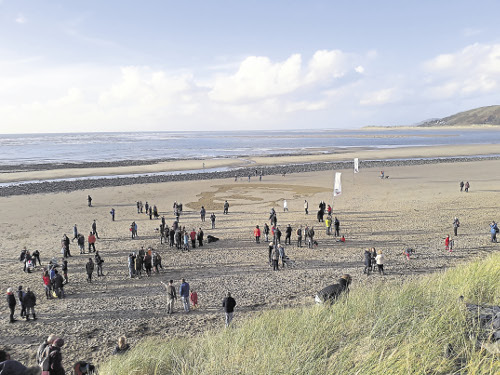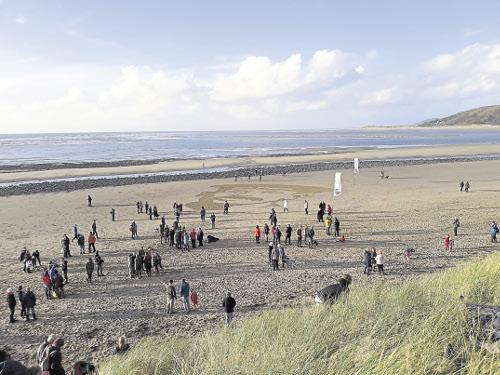

For the fourth year running, Aberystwyth held an act of remembrance at which red, white and purple wreaths were laid together.
The desire for better solutions than continual conflict was made manifest by the increased number of white wreaths that were laid, this year by Aberystwyth town council, Aberystwyth Peace and Justice Network, Aberaid (supporting refugees), Borth and Aberystwyth Women in Black, Côr Gobaith (Choir of Hope), Côr y Gors (Borth Choir) and Aberystwyth Quakers.
A purple wreath was also laid to remember animal deaths in war. The parade through town, the two-minute silence, and the wreath-laying are a formal affair with many groups represented – from the British Legion to the Brownies – but we are there too, laying our wreaths respectfully and silently.
It makes a powerful statement of the kind of community in which we live, that we are able to do this together – wearing white poppies, wearing red poppies, wearing both, wearing purple, wearing none….
Nearby Ynyslas beach was among those chosen to be part of Danny Boyle’s commemorative event, Pages of the Sea.
Drawn in the sand of the wide beach was the portrait of a young merchant sailor, Richard Davies, from the nearby village of Borth. Born on 29 December 1863, Richard was a royal naval reservist. At the outbreak of war, he was posted to HM Trawler Evangel. On 25 March 1917, Evangel was on patrol off Milford when she struck a mine and sank with the loss of 25 lives.
Richard was remembered by a large crowd, many wearing white poppies, who gathered to see the portrait, to make other sand pictures, and to listen to Côr y Gors sing in memoriam, and of hope for the future.
The event, which also included the telling of family stories and memories, borrowed its name from Carol Ann Duffy’s featured poem, ‘The Wound in Time’, profound and moving, as was the erasing of Richard Davies’ portrait by the tide:
History might as well be water, chastising this shore; for we learn nothing from your endless sacrifice. Your faces drowning in the pages of the sea.

